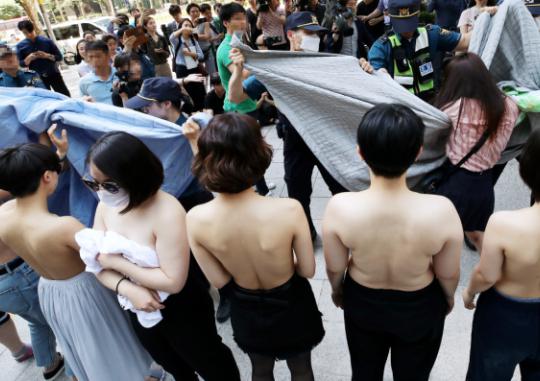People Baring Skin and People Eyeing Skin: Who Is Responsible for Setting a Standard on Obscenity?
이 글자크기로 변경됩니다.
(예시) 가장 빠른 뉴스가 있고 다양한 정보, 쌍방향 소통이 숨쉬는 다음뉴스를 만나보세요. 다음뉴스는 국내외 주요이슈와 실시간 속보, 문화생활 및 다양한 분야의 뉴스를 입체적으로 전달하고 있습니다.
[경향신문] Over the weekend, women protested Facebook's gender-discriminatory regulations by going topless. The police announced that they would review arresting the participants for indecent exposure, only to trigger criticism for failing to understand the purpose of the demonstration and for treating the female body as a sexual object.

Female activists who were also members of a civic group called Fire Femi Action staged a performance by going topless after a press conference condemning Facebook Korea's regulations on the removal of pictures of topless women in front of the company's office in Yeoksam-dong, Seoul at 1 p.m. on June 2. They each wrote a letter on their bodies, which together said, "My body is not obscene," and went completely topless before the reporters. They then held signs with the words, "Why did you delete my breasts, which I displayed of my own free will?" and "Release my body from the modern corset."
The police immediately covered the women with blankets. The activists protested questioning, "Why are you covering us up when nobody has reported us?" and "Is this how you respond to men who go topless?" The performance ended in ten minutes.
The debate heated up when news spread that the police was considering arresting the protestors for indecent exposure.
According to Article 245 of the Criminal Act, "A person who publicly commits an obscene act shall be punished by imprisonment for not more than one year, a fine not exceeding five million won, detention, or a minor fine." A Supreme Court precedent defines indecent exposure as "an act that stimulates sexual desire, induces sexual excitement and triggers sexual shame among ordinary citizens in a situation that can be recognized by an unspecified number of masses."
The women criticized, "Claiming that the people who took part in the performance뾵here they took their tops off arguing that the female body was not obscene뾵ere engaging in indecent exposure is proof that the police sees the female body as a sexual object."
Yun-Kim Ji-yeong, a professor at the Institute of Body & Culture at Konkuk University said, "Excluding the political message and simply declaring the female body as obscene is tailoring the female body from a masculine perspective."
Previously at the Menstruation Festival on May 26, Fire Femi Action went topless and posted pictures taken at the time on their Facebook page. Facebook Korea deleted the pictures claiming that they violated the company regulations on nude images and sexual activities. Fire Femi Action argued that classifying topless pictures of women as obscene, while allowing topless pictures of men, was a typical example of treating the female body as a sexual object as well as an act of misogyny.
As the controversy spread, Facebook Korea released a statement on June 3, the day after the demonstration, and apologized. "We deleted the pictures due to an error," the company said. They further explained, "Our regulations do not allow naked images, but they do allow nude images in connection to demonstrations. The latest pictures were deleted after being classified as nude images, without checking to see if those images were related to a demonstration. We restored the posts after confirming our error."
Copyright © 경향신문. 무단전재 및 재배포 금지.
- 네이버, 소프트뱅크에 ‘라인’ 경영권 뺏길판…일본 정부서 지분 매각 압박
- “육군은 철수...우린(해병) 한다” “사단장님이 ‘하라’ 하셨다”···채 상병 사건 녹취록 공
- [스경X초점] “씨X·개저씨” 민희진 기자회견, 뉴진스에 도움 됐을까
- 나경원, ‘윤 대통령 반대’ 헝가리식 저출생 해법 1호 법안으로···“정부 대책이 더 과격”
- 공수처, ‘이정섭 검사 비위 폭로’ 강미정 조국혁신당 대변인 조사
- “매월 10만원 저금하면 두 배로”…다음주부터 ‘청년통장’ 신청 모집
- 아동 간 성범죄는 ‘교육’ 부재 탓···사설 성교육업체에 몰리는 부모들
- [초선 당선인 인터뷰] 천하람 “한동훈은 긁어 본 복권…정치 리더로서 매력 없어져”
- 니카라과, “재정 악화” 이유로 한국 대사관 철수 통보
- 현대차, 차량 내부 20℃ 이상 낮춰주는 틴팅필름 개발…‘뙤약볕’ 파키스탄서 실증